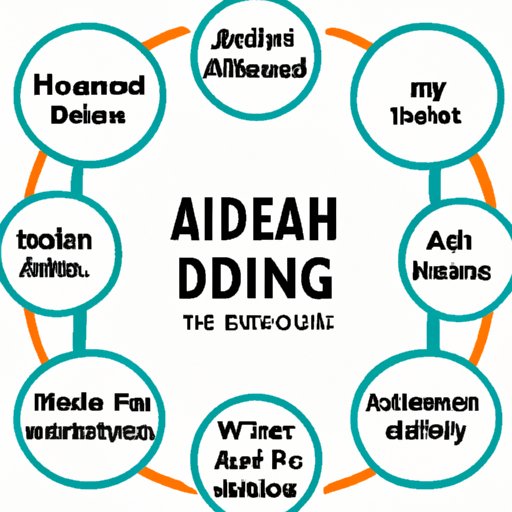Introduction
Attention-Deficit/Hyperactivity Disorder (ADHD) is a common neurological condition that affects both children and adults. Individuals with ADHD struggle with concentration, impulsiveness, and hyperactivity. However, ADHD is often misdiagnosed or left undiagnosed, leading to negative impacts on daily life. This article aims to provide a comprehensive guide on how to get diagnosed for ADHD, the process of diagnosis, and overcoming common misconceptions regarding mental health.
Getting an ADHD Diagnosis
Getting an ADHD diagnosis involves various steps that start with talking to a doctor or a mental health professional.
Step-by-step guide to getting an ADHD diagnosis
- Talking to a doctor or mental health professional: Start the diagnosis process by talking to a doctor or mental health professional. This can be a family doctor, pediatrician, psychiatrist, or psychologist. They can assess your symptoms and refer you to a specialist if necessary.
- Providing medical and personal history: Your doctor or mental health professional will ask for your medical and personal history to understand your situation better and rule out other medical conditions that may mimic ADHD symptoms.
- Discussing Symptoms: You will need to discuss your symptoms. Write down your observations and challenges you have faced and bring them to your doctor’s appointment.
- Diagnostic testing: Your doctor may recommend psychological testing, behavioral monitoring, or brain scans to get a better understanding of your symptoms and to determine if you have ADHD.
Common misconceptions about ADHD
Some common misconceptions about ADHD include:
- ADHD is just a lack of discipline
- ADHD only affects children
- ADHD medication is a quick fix
- ADHD is not a real condition
Types of professionals who can diagnose ADHD
Professionals who can diagnose ADHD include:
- Psychiatrists
- Psychologists
- Clinical social workers
- Pediatricians
- Neurologists
- Primary care doctors
Navigating the ADHD Diagnosis Process
The ADHD diagnosis process can feel daunting, but breaking it down into smaller steps can make it more manageable.
Breaking down the process into smaller steps
- Reach out to your doctor or mental health professional for an initial assessment.
- Prepare for your appointments by documenting your symptoms.
- Be open and honest with your doctor or mental health professional about your concerns. Remember that they are there to help you, and everything is confidential.
- Take any diagnostic tests recommended by your doctor or mental health professional.
- Always ask questions when you are unsure of something or want more information.
Addressing concerns about seeking mental health treatment
Seeking mental health treatment can come with a stigma attached to it, but it’s essential to prioritize your mental well-being. Remember that seeking help is a sign of strength, and it’s okay to ask for help. Talking openly about mental health can break down stigmas and encourage others to seek out the help they need.
Personal Stories
Hearing about personal experiences can help to normalize the process of seeking an ADHD diagnosis.
Sharing personal experiences with ADHD diagnosis
Many individuals with ADHD experienced negative social or academic impacts before their diagnosis. For instance, adults with ADHD often face a lack of focus in their work and personal relationships, which can negatively affect their self-esteem or confidence.
Normalizing experiences
It’s important to recognize that seeking an ADHD diagnosis is a common experience and nothing to be ashamed of. Normalizing experiences can help individuals with ADHD feel less alone and encourage them to seek help.
Addressing stigma surrounding mental health
Mental health stigmas can prevent individuals from seeking necessary medical attention. Encouraging conversations about mental health may increase acceptance and normalization of mental health diagnoses.
ADHD Diagnosis as an Adult
ADHD isn’t just a condition that affects children; it’s prevalent in adults too.
Challenging the notion that ADHD only affects children
While ADHD is typically associated with children, research shows it can persist into adulthood, and up to 4% of adults have ADHD. Adults with ADHD often struggle with managing their time, focus at work, and maintaining personal relationships.
Understanding the process of getting a diagnosis as an adult
The process of getting an ADHD diagnosis as an adult is similar to that of a child. It starts with visiting a doctor or mental health professional to discuss symptoms and medical history. Diagnostic tests and assessments may be recommended to determine the diagnosis.
Providing resources for adults with ADHD
Resources for adults with ADHD include support groups, online forums, and therapy. Counselling can serve as a resource on ways to manage symptoms in daily life.
FAQ
Below are some frequently asked questions about ADHD diagnosis:
Types of diagnostic testing
Diagnostic tests may include psychological tests, behavioral monitoring, or brain scans.
How to prepare for an appointment with a mental health professional
Documenting your symptoms can help professional notes and bring a detailed history to review.
Treatment options
Treatment options for ADHD may include therapy, medication, or lifestyle changes. The best treatment plan will depend on the individual situation.
Costs of ADHD Diagnosis
Addressing financial concerns
Getting an ADHD diagnosis can come with fees associated with appointments and diagnostic testing. It’s worth checking with your insurance provider to see if ADHD is covered in the policy.
Insurance coverage
Insurance coverage for ADHD diagnosis will vary, so it’s important to check with a doctor and insurance provider for specifics.
Affordable options
For those concerned about expenses involved in seeking an ADHD diagnosis, low-cost options may be available. Many mental health clinics offer sliding scale fees based on income, and university systems often offer low-cost support options for students. Research the resources available to you and take advantage of affordable options.
Conclusion
Getting an ADHD diagnosis can have a significant impact on improving daily life. Through this article, we aimed to provide a comprehensive guide with steps on how to get diagnosed, common misconceptions about ADHD, breaking down the diagnosis process, personal stories, ADHD diagnoses as adults, and addressing stigmas surrounding mental health. It’s essential to prioritize mental health and seek help with ADHD symptoms to maximize the quality of life.
